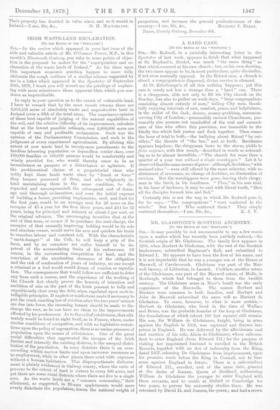LETTERS TO THE EDITOR.
FIXITY OF TENURE IN BENGAL.
(To TIM EDITOR OF TUE " Spneung.1 SIR,—.1 ask permission to occupy a small portion of your valuable apace, in reply to "An Old Bengalee." I do not think that many readers of the Spectator will confuse, as he does, fixity of tenure with fixity of rent. I see no necessary or even desirable connection between the two things, for fixity of rent might act injuriously upon landlord and tenant alternately. "An Old. Bengalee " says that it has been found impossible in Bengal to lay down any principle upon which rents can be enhanced. This is a most extraordinary error, for Act 8 of 1869 lays down, in clause xviii., most clearly three grounds upon which rents may be enhanced. I give the essence only, to save space. First, that the rent paid is below the prevailing rate in adjacent places. Second, that the value of the produce or productive power has increased/rani other causes than by the agency of the tenant, or at Ms capizsc. Third, that land held hag proved by measure- ment to be larger than he has paid for. How, then, can your correspondent say that no principle has been laid down, and that none is possible P It may be that there is some difficulty in the working of the principle, although I do not see why .there should. be ; but that is a very different thing from having no principle to work. "An Old Bengalee " makes another mistake, when he says that the settlement of enhancement will give the tenant fixity of rent. The Act does not say so, but if your correspondent will refer to clause iv. of the Act I have quoted, he will find that, as well as giving fixity of tenure, it gives, in certain cases, fixity of rent as well,—viz., to all whose rent had not been changed for twenty years. This was granted, on the assumption that in these eases the rent dated from the per- manent settlement, unless the contrary could be shown.
In the statement of "Objects and Reasons" for legislation, the Government of Bengal in 1855 wrote to the Board of Revenue, quoting the Collector of Chareparun as follows :— "The curse of this district is the insecure nature of the ryot's
tenure Though nominally protected, he has prac- tically no rights in the soil. His rent is continually raised, until he is forced out of his holding, and. takes shelter in the Nepaul tersee." Change "district " into " country," and " Nepaul teraee " into "United States," and it will represent the position of the Trish tenant. There was no lower house composed mainly of &minders, and no upper one of Rajahs, in Bengal, and therefore a despotic Government was free to do what was just, and did. it, in spite of Zemindars and. Rajahs. Their property has doubled in value since, and so it would in







































 Previous page
Previous page